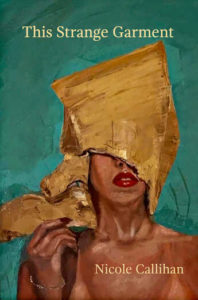 Review by Hester L. Furey
Review by Hester L. Furey
Nicole Callihan’s new book This Strange Garment delivers a stunning sequence of poems about the experience of breast cancer. A survivor myself, I selected the book for the theme, remembering Audre Lorde’s insistence that “cancer is political.” Very quickly, however, the reading of it took me away from familiar generalizations and far out to an unknown sea. In forty-three poems the book bodies forth the manifold strange and alien forms of a truth expressed in a seed sentence, “this is my temporary body.” The first poem is called “Everything is Temporary”; the last poem is the titular “This Strange Garment.” In between the poems are divided into five Roman numeral sections, bringing to mind the five-act play or the oh-so-familiar five-paragraph essay. This work could also serve as a semiotics textbook. Within the poems linguistic experimentation mirrors the bodily processes of breaking down, building up, finding new ways forward, rediscovering what is of value. We accompany the speaker on her journey as she reconsiders her relationship to her body and the language she has been in the habit of using to think and feel it, trying on old terms to see whether they still fit, testing new words as this body encounters change.
Traversing the landscapes of what our society in the United States calls health care, Callihan employs a variety of free verse forms to take the reader through experiences of rooms, procedures, machinery, and discourses, the institutional supports and recourses offered to those who find themselves falling apart in the absurdities of cancer. For example, the same self faces the fear and discomfort of being contained and immobilized for an MRI, the risky unknowns of train rides with well-meaning but dangerous strangers, the absurd semiotic tangents provoked by disembodied medical directives within equipment (“stop breathing” in the MRI) and overheard conversations in transit. The self-defining impulse continually seeks sense but cannot always find it. Sometimes collections of experience defeat us in our attempts to make an “I” out of them. Sometimes we can only drift and observe. Along the way, through Callihan’s poems, we see how words and phrases accrue and lose meaning with repetition, in new settings, on the other side of experience. The texts explore the continual adjustments of physical life and morphing value scales that cancer makes necessary for the witnessing self, the constant re-assessment and shifting meaning of each experience.
Although at times the images shared within the poems can seem brutal, in the end all serve to support self-care and survival. Callihan describes horrendous moments without flinching to create a broader set of acceptable life experiences; in cancer’s new economies, previously unthinkable losses can be examined dispassionately. The suffering and healing body is and is not the self. The time frame also keeps shifting. No one going through this can let themselves be too aware of how long it will take to reach resolution, healing, a pain-free state, or being “cured.” For example, the poet describes in “Eighteen months later I come across a tampon” how an object brings back to the surface a point before diagnosis that she had thought of at the time as a “bad day.” In the rearview she smiles at her folly. Different elements come to the foreground in the new present – as happens in memory more generally, but with a specific emotional charge this time around hormones, feminine flux and temper, blood.
One of the book’s themes is that cancer brings us new people, including ourselves. We find ourselves plunged into intimate closeness with radiation technicians, self-reflect through the filter of statistical and demographic groups, look back on our past selves with despair, see changed faces of friends, and experience sudden points of commonality and difference as all of our social landmarks shift according to whatever the chthonic gods of our particular cancer life decree. In a brilliant prose poem, “To Get to the Other Side” Callihan offers a mashup of moments in the daily relationship with a radiation tech, appropriately named Cliff, thoughts of Marie Curie (inevitable for some of us: the stories of the sores on her heroic hands, the lead-encased radiated corpse still a danger), together with comic survival strategies such as bartender and knock-knock jokes, childhood imaginings of alien abduction, and the repeated mantra, “Healing Radiant Light.”
There is no more common theme than the transitory nature of life, and many poems throughout the history of the world have directly addressed what is temporary, mortal, subject to time. This Strange Garment offers an admirable resistance to the often-repeated narratives and tropes associated with cancer and indeed the larger theme. And inevitably, the sense-maker self meanders through memories of choices, pondering their place in chains of theoretical causality. Everyone who has received this diagnosis wonders what they could have done differently to bring about an alternate universe, not to have to hear those words. Yet these poems bring originality, a genuinely exploratory and open mind, to the realities of disease and aging, refusing self-pity and self-blame. The speaker examines all parts of her experience, still richly veined with the gold of life, even when ugly or grotesque. Instead of the conventional one to ten pain scale, she wants a pleasure scale, she says, and no more moderation. To be sure, an immoderately beautiful book.
This Strange Garment by Nicole Callihan
Terrapin Books, 2023
108 pages, paper.
ISBN 978-1947896611
Hester L. Furey is a poet and literary historian, the author of Skeleton Woman Buys the Ticket, and assistant professor of English at Georgia State University’s Perimeter College.
